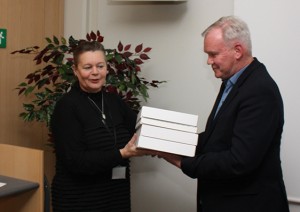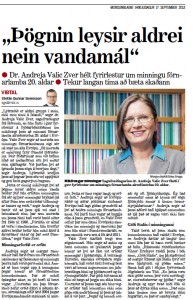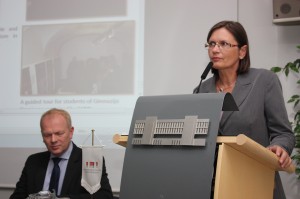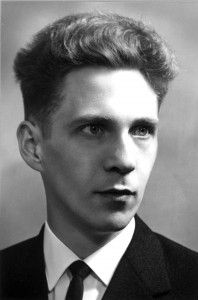At a well-attended meeting at the Icelandic National Library Monday 16 September 2013, Dr. Andreja Valic Zver, director of the Study Centre for National Reconciliation in Ljubljana, Slovenia, gave a lecture on the importance of remembering victims of totalitarianism in Europe. She reminded the audience of the fact that Slovenia suffered, in the 20th Century, the rule of fascists, nazis and communists. Mass graves, mostly from the first years of the communist era, are still being discovered: the communist take-over was a bloodbath. Old secret police men who had murdered people in cold blood were not only walking around free and unworried; some of them were even decorated. It had also been surprising to discover that the EU supported the building of a memorial to Tito, a cruel dictator, even if he refused to be controlled by Stalin. Zver referred to polls which showed a lack of historical consciousness in young Europeans, especially about the misdeeds of communists.
Illugi Gunnarsson, Minister of Education, chaired the meeting. Speakers in the discussion following Dr. Zver’s paper included Professor Ragnar Arnason and Mr. Jon B. Hannibalsson, former Minister of Foreign Affairs. After the discussion, Professor Hannes H. Gissurarson gave a short speech in memory of Professor Arnor Hannibalsson, a philosopher and one of the most forceful Icelandic opponents of totalitarianism in the 20th Century. According to Gissurarson, Professor Hannibalsson—who passed away in December 2012–distinguished himself by three personal qualities: a sense of justice, courage and learning. Indeed, in an earlier age, he would have been called “Arnor the Learned”. Since Dr. Zver had mentioned Polish philosopher Leszek Kolakowski in her talk, Professor Gissurarson recalled that he had had dinner with Kolakowski and Professor Hannibalsson in April 1979. He had asked Kolakowski whether the modern predicament was not that God was dead in the minds of men. Kolakowski replied that the problem was rather that in the minds of men, the devil was dead. There was little awareness of the possibility of evil; people did not want to believe, or shut their ears to, reports on totalitarian atrocities.

National Librarian Ingibjorg Steinunn Sverrisdottir receives the Comintern files from Hannes H. Gissurarson. Photo: Olafur Engilbertsson.
Professor Gissurarson then handed over to the National Library of Iceland the documents which Professor Hannibalsson—who was educated in Russia and spoke fluent Russian—had found in archives in Moscow after the collapse of the Soviet Union. These documents are mostly from the Comintern archive: the Icelandic Communist Party, founded in 1930, belonged to the Comintern, and later, the leaders of the Left Socialist Party, operating between 1938 and 1968, maintained close ties, if only secretly, with the masters of the Kremlin. Professor Gissurarson said that many interesting things were to be found in these documents, even if they served rather to deepen than to change our views on the relationship between Icelandic communists and the international communist movement. When Professor Hannibalsson’s health failed, he gave the documents to Gissurarson who used them for his book, published in 2011, about Icelandic Communists 1918–1998.
 The meeting with Dr. Zver was held in honour of Professor Arnor Hannibalsson, and the occasion was that 16 September marked the final day of the photo exhibition at the National Library on “International Communism and Iceland” which was opened 23 August, on the Remembrance Day for Victims of Totalitarianism in Europe, designated by the European Parliament. The day was chosen because on 23 August 1939, Hitler and Stalin made the non-aggression pact by which they divided up Central and Eastern Europe between them and started the 2nd World War. The meeting was co-sponsored by the Institute of International Affairs at the University of Iceland and by Vardberg, the Icelandic Atlantic Association. The meeting forms a part of the joint RNH-AECR project on “Europe of the Victims”. After the meeting, Professor Gissurarson held a reception for Dr. Zver at his home. The guests included the Minister of Education, Illugi Gunnarsson, the Icelandic National Librarian, Ms. Ingibjorg Steinunn Sverrisdottir, Ms. Sigridur Snaevarr, former Icelandic Ambassador to Slovenia (residing in Paris), and Professor Ragnar Arnason. Dr. Zver’s husband, Milan Zver, was Minister of Education in Slovenia in 2004–8 and is now a member of the European Parliament. Morgunbladid published an interview with Dr. Zver 17 September where she discussed, among other things, history teaching in Europe. Vidskiptabladid reported 19. September on the meeting with Dr. Zver and the Comintern files.
The meeting with Dr. Zver was held in honour of Professor Arnor Hannibalsson, and the occasion was that 16 September marked the final day of the photo exhibition at the National Library on “International Communism and Iceland” which was opened 23 August, on the Remembrance Day for Victims of Totalitarianism in Europe, designated by the European Parliament. The day was chosen because on 23 August 1939, Hitler and Stalin made the non-aggression pact by which they divided up Central and Eastern Europe between them and started the 2nd World War. The meeting was co-sponsored by the Institute of International Affairs at the University of Iceland and by Vardberg, the Icelandic Atlantic Association. The meeting forms a part of the joint RNH-AECR project on “Europe of the Victims”. After the meeting, Professor Gissurarson held a reception for Dr. Zver at his home. The guests included the Minister of Education, Illugi Gunnarsson, the Icelandic National Librarian, Ms. Ingibjorg Steinunn Sverrisdottir, Ms. Sigridur Snaevarr, former Icelandic Ambassador to Slovenia (residing in Paris), and Professor Ragnar Arnason. Dr. Zver’s husband, Milan Zver, was Minister of Education in Slovenia in 2004–8 and is now a member of the European Parliament. Morgunbladid published an interview with Dr. Zver 17 September where she discussed, among other things, history teaching in Europe. Vidskiptabladid reported 19. September on the meeting with Dr. Zver and the Comintern files.




